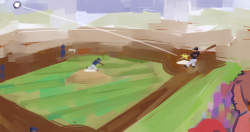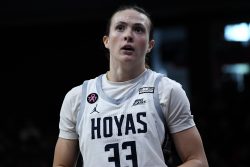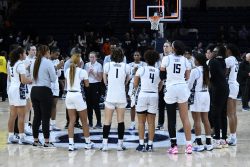The NCAA announced Wednesday afternoon that Georgetown’s Department of Athletics will be placed on probation for three years following major violations committed by the baseball program from 2000 to 2007. It is Georgetown’s first-ever major NCAA rules violation.
Among various penalties levied by the NCAA Committee on Infractions, Georgetown must also vacate records from all games in which 26 ineligible players participated.
The violations stem from time-keeping errors which resulted in student-athletes receiving over $61,000 in unearned work-study funds.
In a conference call Wednesday, interim athletic director Dan Porterfield said that Georgetown would not appeal the NCAA’s decision.
“The matter involves only the baseball program, and our investigation found no other infractions in any other sports,” Porterfield said. “The NCAA takes these issues seriously, and so does Georgetown.”
The violations involved federal work-study funds, but the University addressed the issue with the Department of Education and repaid the funds.
Georgetown self-reported the violations after discovering the payment issues in June 2007. The University has cooperated with the NCAA throughout the investigation, performing an independent investigation into the situation and self-imposing regulations before the Committee’s ruling.
According to a summary of the University’s report available on GUHoyas.com, the violations began when the baseball team moved from a field on-campus to a field in Maryland. Baseball players were allowed federal work-study jobs within the program, such as performing maintenance on the field and doing laundry for the team. These jobs had traditionally been overseen by an equipment manager, but when the team moved fields, this responsibility shifted to an unnamed assistant coach.
The University’s report claims that once the program moved off campus, a “general, although misguided, understanding” developed that it was unnecessary to record players’ specific work intervals. The assistant coach supervising work-study for baseball players instructed the athletes to record a maximum of 20 hours worked per week, assuming enough work would be assigned to justify the reported hours. In many cases, this did not occur, resulting in $61,522 in unjustified compensation to 26 players.
Georgetown’s violations did not give the baseball program a competitive advantage, and the University found no evidence that the work-study payments were used as a tool in recruiting.
In a letter posted on GUHoyas.com, University President John DeGioia said he was “disappointed that [the violations] occurred, but pleased with our comprehensive response.”
The University’s self-imposed regulations included banning athletes from holding work-study positions with their own teams and greatly increasing oversight to the student-athlete work-study program.
The NCAA Committee on Infractions added a three year probationary period, forfeiture of all wins involving the 26 ineligible players, and a limitation of five scholarships for the baseball program through the 2011-12 academic year.
The NCAA normally allows Division I baseball programs 11.7 scholarships. Georgetown, however, did not use the full allotment of scholarships; the University only allocated five scholarships to the baseball program before the violations (the sanction prevents a proposed addition of three more scholarships).
“Had these student-athletes simply been given the money in the form of a scholarship, there would have been no problem,” Porterfield said. “The problem is that they were supposed to be earning the money through a work-study program, and that has to be carried out.”
Perhaps the most significant punishment is the prescribed vacation of all Georgetown’s records involving the ineligible players. Although the baseball program did not have a winning season during the timeframe when the violations occurred, the team could still be forced to vacate as many as 134 wins.
Head coach Pete Wilk, who has managed the team since 1999, accepted responsibility for his failure to oversee his team’s work-study program, but he was found to have no knowledge of the violations. Wilk was reprimanded and required to attend a NCAA rules seminar, but he will remain the team’s coach.
“I regret deeply that these violations occurred,” he said in the University’s report. “They besmirch my reputation, and the reputation of the institution I love.”
Note: The original version of this article has been corrected. The original article stated that the amount of overpaid work-study was $61,152, the correct total is $61,552. Also, the article initially stated that the baseball program was placed on probation; that sanction applied to the entire athletic department.




